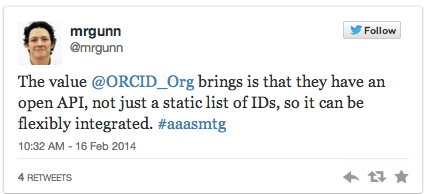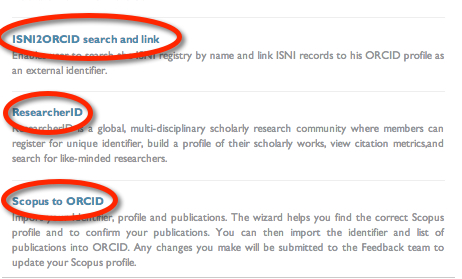I recently returned from the annual meeting of the American Association for the Advancement of Science (AAAS), where I participated in a panel discussion on Evaluating the Global Impact of Research Investments. This was a great opportunity to share with other members of the research community the importance of persistent identifiers in creating an effective evaluation infrastructure. Slides from the event are available on Slideshare.
The principal theme of this panel discussion was that persistent identifiers and research data exchange standards are essential evaluation tools. An internationally-used name identifier for researchers is of particular importance because without it we will continue in our current sorry state– unable to reliably connect researchers to their contributions because of our reliance upon names to identify people. Common, changeable, misspellable names!
 ORCID provides the infrastructure and tools for researchers to better articulate their contributions, ensuring that they get credit for their contributions. Every time. Once registered, researchers can use tools in the ORCID Registry to link their ORCID identifier to their affiliations, works, other person identifiers, and (soon) funding. To ensure correct attribution on new contributions, researchers can use their identifier throughout their career when submitting manuscripts, grants, and datasets.
ORCID provides the infrastructure and tools for researchers to better articulate their contributions, ensuring that they get credit for their contributions. Every time. Once registered, researchers can use tools in the ORCID Registry to link their ORCID identifier to their affiliations, works, other person identifiers, and (soon) funding. To ensure correct attribution on new contributions, researchers can use their identifier throughout their career when submitting manuscripts, grants, and datasets.
ORCID is more than just another ID. It is a unique and persistent identifier that is being used as a bridge between existing discipline- or work-type specific person identifiers, and also to link together persistent identifiers for objects (e.g., DOIs) and organizations (e.g., ISNIs, Ringgold IDs). Because ORCID provides an open API, it provides a key component to support exchange of research information between systems.

By working collaboratively and encouraging researcher adoption, we are building a robust central registry of information that can be openly shared by scores of research systems around the globe–creating better data to support outcomes reporting and evaluation. To date, more than 120 organizations have joined ORCID as members and are integrating the ORCID identifier into their systems–and using the ORCID API to interoperably exchange data across systems. Researchers can use their ORCID iD when they submit manuscripts for publication, grants for funding, and more.
Funders particularly value ORCID as a way to support evaluation of their programs. Liz Allen, Head of Evaluation at the Wellcome Trust says that “Greater precision and transparency of the research outputs linked to a particular funder or grant is vital to help us better understand the impact of our funding.” Sally Rockey, Deputy Director for Extramural Research, U.S. National Institutes of Health, further states that, “Identifying the output of individuals with commonly occurring names is difficult. Reducing name ambiguity within and across data systems is always expensive and time consuming. A broadly used researcher ID also will facilitate the identification of scientific output from those who work outside federally funded research programs.”
We will be continuing this conversation at the National Postdoctoral Association meeting in St. Louis in April, where I will be co-facilitating a workshop with Wally Schaffer from the U.S. National Institutes of Health and Melanie Sinche from Harvard University on Postdoc Identification and Tracking: Building a Robust Network of Unique Researchers. In that workshop, Dr. Schaffer will share information about integration of ORCID identifiers into the SciENcv biosketch platform, and we will discuss how universities and research institutes can more reliably identify their researchers and track outcomes over time using ORCID identifiers. I hope you can join us!
